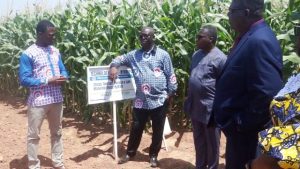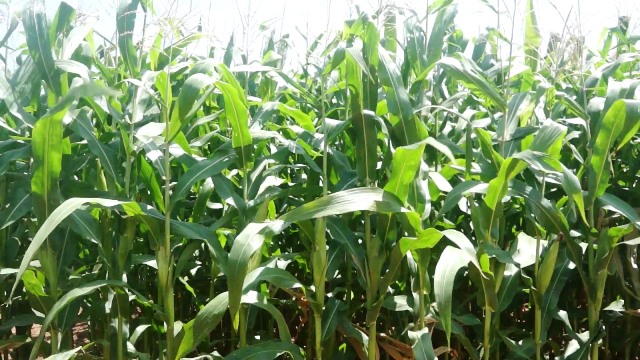The Council for Scientific and Industrial Research – Savanna Agricultural Research Institute (CSIR-SARI) has unveiled seven newly developed hybrid maize varieties that exhibit resistance to the fall armyworm pest.
This initiative, launched at the CSIR-SARI Technology Park in Nyankpala, represents a significant advancement in Ghana’s commitment to enhancing food security and improving the livelihoods of smallholder farmers across the nation.
The fall armyworm has emerged as a major threat to maize cultivation in Ghana over the past decade. Renowned for its rapid proliferation and significant destructive capacity, this pest has consistently diminished maize yields and adversely impacted the income of numerous farming households, particularly in the five regions of the north where maize is a critical food and cash crop.
Following extensive research and field testing, the scientists at CSIR-SARI successfully developed hybrid maize varieties that are capable of withstanding fall armyworm infestations. These varieties do not only provide robust resistance but also yield significantly higher outputs compared to traditional maize types, marking a pivotal breakthrough for Ghana’s agricultural sector.
The new varieties of maize are: CSIR-wobil Moyaa, CSIR-Abebe, CSIR-Nkwagge, CSIR-Denbea, CSIR-Kpari-Faako, CSIR-Bihilifa and CSIR-Wang-Dataa.
At a recent event to launch the new varieties of maize, Dr. Charles Nalimor, a Maize Breeder and Manager of the CSIR-SARI Technology Park, articulated the key features of the newly developed maize varieties, which have been specifically bred to enhance pest resistance, productivity, and adaptability.
Dr. Nalimor noted, “These maize varieties can yield between 6 and 6.6 tonnes per hectare when managed under optimal agronomic practices. They are designed to assist farmers in minimizing losses, lowering pesticide expenses, and ultimately enhancing household incomes and food security.”
He further highlighted that this initiative is in accordance with Ghana’s broader agricultural transformation agenda, which seeks to leverage science, technology, and innovation to improve productivity and sustainability within the sector.
 Emphasizing the environmental benefits, Dr. Nalimor stated that the introduction of these varieties aims to diminish the dependency of smallholder farmers on chemical pesticides, many of which are costly and pose environmental risks. “Our objective is to ensure that farmers derive greater value from their efforts while concurrently safeguarding the environment,” he concluded.
Emphasizing the environmental benefits, Dr. Nalimor stated that the introduction of these varieties aims to diminish the dependency of smallholder farmers on chemical pesticides, many of which are costly and pose environmental risks. “Our objective is to ensure that farmers derive greater value from their efforts while concurrently safeguarding the environment,” he concluded.
Science Driving Agricultural Transformation
The Council Chairman of CSIR-SARI, Engineer Mark Anthony Taylor, commended the research team for their dedication and innovation. He described their recent breakthrough as a powerful example of how scientific research can directly contribute to economic growth and social development.
“This achievement demonstrates that science and innovation have the potential to transform agriculture,” Engineer Taylor stated. “Agriculture is a fundamental pillar in alleviating poverty, creating jobs, and promoting sustainable national development. When we empower our scientists, we also empower our farmers and secure our future.”
He urged for increased investment in agricultural research and technology to ensure that such innovations are scaled up and made accessible to farmers throughout all regions of Ghana.
Commitment to Continued Research
During the event, Professor Paul P. Bosu, the Director-General of the Council for Scientific and Industrial Research (CSIR), reaffirmed the institute’s commitment to advancing agricultural research and developing innovative technologies that address the pressing challenges of climate change and pest threats.
“We are dedicated to producing hybrid seed varieties that are drought-resistant, pest-resistant, and well-suited to diverse ecological zones,” stated Prof. Bosu. “Our objective is to equip Ghanaian farmers with access to resilient and high-performing seeds to secure the nation’s food future.”
 Prof. Bosu further highlighted that the work of CSIR-SARI is integral to the council’s broader mission to promote science-based solutions to the development challenges faced by Ghana. He emphasized that innovations in crop breeding, soil management, and climate-smart agriculture are central to the institute’s research agenda.
Prof. Bosu further highlighted that the work of CSIR-SARI is integral to the council’s broader mission to promote science-based solutions to the development challenges faced by Ghana. He emphasized that innovations in crop breeding, soil management, and climate-smart agriculture are central to the institute’s research agenda.
Enhancing Livelihoods and National Food Security
Maize stands as one of Ghana’s most important staple crops, serving as a fundamental source of food, feed, and income for millions of households. However, ongoing challenges such as recurrent pest infestations and unpredictable weather patterns have adversely affected productivity, particularly in northern Ghana.
The introduction of new fall armyworm-resistant maize varieties is anticipated to significantly reduce crop losses and enhance the resilience of maize production systems. By enabling farmers to achieve higher yields with fewer inputs, this innovation is projected to improve livelihoods, promote food self-sufficiency, and contribute to national economic growth.
Agricultural experts believe that these hybrid varieties will effectively address the disparity between local maize demand and production, thereby reducing the dependence on imports and stabilizing food prices across the nation.
As Ghana continues to navigate the impacts of climate change, the initiatives undertaken by CSIR-SARI underscore the critical importance of homegrown scientific research in securing the agricultural future of the country. The institute’s commitment to innovation provides a promising pathway toward a more resilient, productive, and food-secure Ghana.
Source: www.KumasiMail.Com/Hoenyefia Noah Nash


































































